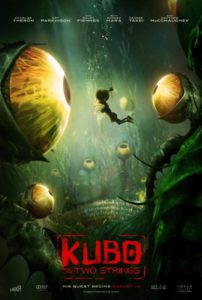Kubo and the Two Strings
4/5
I grew up watching movies. Every Friday night my sister and I would settle into the couch as my parents popped a flick into the VCR. It was a time to be truly at ease; there was no school worry, no chores to be done. It was a cathartic relief of sorts. We loved movies like The Emperor’s New Groove (2000) and Tarzan (1999), and we had favourite parts that hung with us days after we’d seen them. Our staples were The Incredibles (2004) and Robin Hood: Men in Tights (1993), and at one point we could act out, with full dialogue, the entirety of both films.
I still love those movies—although I am content to watch them a tad less often—for more or less the same reasons. They still evoke a sense of wonder; they still make me laugh (a true laugh, not the kind you get at Deadpool [2016], or Suicide Squad [2016], which is really more of an aghast release of air); they are still beautiful.
Kubo and the Two Strings is all of these things, and it’s one of the best movies I’ve seen all year. Its story is engaging throughout, which is a shockingly uncommon trait in modern films (Central Intelligence [2016] was decidedly hit-and-miss, Finding Dory [2016] struggled at times, and Suicide Squad was in fact never engaging).
Kubo has the kind of story that unfolds before you, leading you down the path that it wants you to take. There was rarely a predictable moment, but it wasn’t all left turns and plot twists; it just wasn’t ploddingly forthright like the aforementioned films.
Only a film that comes from Laika Studios, the same people behind Coraline (2009), could look as surreally magical as Kubo does. Part of The Incredibles’ appeal is how outlandish and how truly incredible it looks. Animated films aren’t confined to the same realities that live-action films are (no matter how much CG you throw at it), so it’s in them that real wonder can be translated from a director’s head to the viewer’s.
What I enjoyed about Kubo most was that through sheer display of excellence it was able to transport me back to those Friday-night movies on the couch. A combination of un-cynical filmic delight on the part of the creators and my own love for animated adventure flicks made this an easy film to be swept away by.
If you grew up with the same Kronk and Syndrome that I did, you’ll love this film as much as I do.


